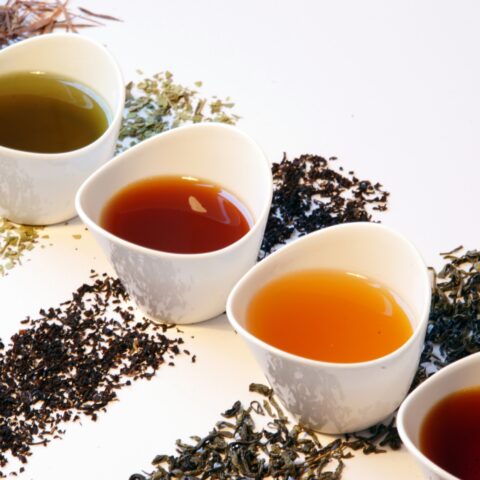Coffee Drinking Revisited: Research Shows Therapeutic Benefits to Consuming Coffee

Note: Read our latest thoughts on drinking coffee: Is Coffee Paleo?
Previous blogs at The Paleo Diet about coffee have not exactly given a glowing report for the common beverage. However, the research on coffee is expanding rapidly with over seven percent of all studies on its health effects being published in the last year. A great deal of new research is pointing in the direction that previously unknown benefits may help outweigh the negatives, resulting in a potential zero-sum game for those having a hard time eliminating coffee from their daily regime. That being said, new research also continues to show negative effects.
From a Paleo perspective, a prudent action may be to continue placing coffee consumption in your 15%, non-Paleo category, and consider its elimination altogether if you have health issues that the research suggests could be caused by its consumption. This latter approach is effective whenever addressing the consumption of non-Paleo foods as it can help individuals stay compliant with the Paleo dietary template while eliminating problematic foods as needed. It’s also important to consider the source of your coffee. Obtaining your coffee from brewers that follow organic practices (and note that some can’t afford the certification but still do) helps eliminate some of the negatives while maintaining the positives.
Coffee drinking is one of the most ubiquitous dietary habits in the modern world. Enjoying a good cup of Java to start the morning is an accepted morning ritual in Western culture. Coffee provides a warming drink while giving you a good jolt of caffeine, unless you drink decaf.
Over the years, coffee drinking and caffeine consumption have been critically examined by the medical and health community – is coffee good for our health? Bad for our health? Or does it have no effect? A search of the US National Library of Medicine using “coffee” reveals 12,320 research papers on the topic. Narrowing the search to the more appropriate term “coffee consumption” reduces the number of papers to 3,810. Over seven percent of these papers were published just in the last year.
One of the most powerful analytical tools scientists and epidemiologists have employed to answer complex nutritional questions over the past 20 years is meta-analyses. Meta-analyses are in essence an analysis of analyses. Statisticians have developed special procedures that allow them to analyze multiple studies even when the studies do not necessarily agree. Meta-analyses, therefore, unify the results of multiple studies and provide a powerful insight into the collective study results.
Because coffee drinking is such a widespread habit in the western world, thousands of research studies have examined its effects on our health and well-being and meta-analyses of these studies have recently appeared. Generally, they indicate coffee drinking has little or no adverse effects on our health, and may actually prevent disease1-28. In fact, meta-analyses of all-cause mortality demonstrate that coffee consumption reduces the risk of death from all causes combined1-4. Similarly, a meta-analysis of prospective, observational studies indicated that coffee drinking reduced the risk of oral, pharynx, liver, colon, prostate, endometrial, and melanoma cancers19 – a result that is consistent with other meta-analyses of specific cancers11-23. Further, meta-analyses have shown potentially lowered health risks with coffee consumption for a variety of conditions including cardiovascular disease (CVD) risk5-10, kidney disease25, gout24, urinary incontinence27, and non-alcoholic liver disease28. It may even increase longevity26.
However, the picture becomes cloudier when another meta-analysis of seven randomized controlled trials showed that acute coffee ingestion reduces insulin sensitivity in healthy subjects29 and a meta-analysis of prospective observational studies demonstrated that coffee consumption increases the risk for lung cancer30. It is also important to recognize that meta-analyses derived from observational studies hold considerably less clout than those derived from randomized controlled trials or even single randomized controlled trials themselves. Consequently, a systematic review of epidemiological studies and randomized controlled trials of coffee consumption and sleep showing a deleterious effect has to be recognized as significant31. Further, acute coffee consumption impairs or worsens the glycemic response32, so along with the finding that acute coffee ingestion reduces insulin sensitivity29, these studies are suggestive that coffee may alter normal glucose metabolism.
One of the issues with earlier research on coffee consumption was that it focused on caffeine. More recent research has expanded its focus to other prominent biologically active compounds, particularly the main polyphenols of coffee: chlorogenic acids (CGAs)33. Perhaps the conflicting findings from the meta-analyses of coffee drinking can be attributed to the fact that dietary polyphenols are substrates for the microbiota in the colon34. Key to maintaining gastrointestinal health is the interaction of these polyphenols and their metabolites with epithelial cells, as well as modulating gut microbial composition. In their review of polyphenols and the gut microbiota, Hervert-Hernández et. al. point out that “polyphenols may act as promoting factors of growth, proliferation, or survival for beneficial gut bacteria—mainly Lactobacillus strains—and thus, exerting prebiotic actions and inhibiting the proliferation of some pathogenic bacteria such as Salmonella and Helicobacter pylori species.”
The gut microbiome in human physiology is now one of the most important areas of research in human health and disease. Its complexity and individual variability is well established and so it should not be surprising that individuals could have a very different response to coffee consumption, containing a high polyphenol content, given an extremely varied microbiome from person to person. So perhaps coffee is only beneficial, and hence should only be consumed by, those with a healthy microbiome? Since a Paleo diet helps promote a healthy microbiome, those following the diet may well be the ones to benefit the most from a cup of Java.
Phenolic acids are the main polyphenols made by plants and recent research has also shown that these polyphenols help to lower lysophosphatidylcholines which are known to be a pathological component of oxidized-LDL as well as having pro-inflammatory properties35. This demonstrates another potential health benefit of consuming coffee.
CGAs, independent of caffeine content, have also been shown to improve vascular function, in particular by increasing flow-mediated dilatation36. The improvements appear to be directly related to the CGA content of the coffee, making the coffee bean roasting process all the more important.
Taking into consideration all of the research on coffee consumption, both positive and negative, it appears that based on individual responses, coffee can potentially be a healthy addition to one’s dietary template. That being said, for certain individuals, coffee may not represent a healthy option and one should assess the physiological response to its consumption on an individual basis. However, if one ultimately chooses to include coffee in their dietary plan, it makes sense to obtain coffee from roasters that utilize practices that maximize the quality of the coffee and the associated beneficial biologically active compounds.
References
All Cause Mortality
[1] Crippa A, Discacciati A, Larsson SC, Wolk A, Orsini N. Coffee consumption and mortality from all causes, cardiovascular disease, and cancer: a dose-response meta-analysis. Am J Epidemiol. 2014 Oct 15;180(8):763-75
[2] Grosso G, Micek A, Godos J, Sciacca S, Pajak A, Martínez-González MA, Giovannucci EL, Galvano F. Coffee consumption and risk of all-cause, cardiovascular, and cancer mortality in smokers and non-smokers: a dose-response meta-analysis. Eur J Epidemiol. 2016 Oct 3. [Epub ahead of print]
[3] Je Y, Giovannucci E. Coffee consumption and total mortality: a meta-analysis of twenty prospective cohort studies. Br J Nutr. 2014 Apr 14;111(7):1162-73
[4] Zhao Y, Wu K, Zheng J, Zuo R, Li D. Association of coffee drinking with all-cause mortality: a systematic review and meta-analysis. Public Health Nutr. 2015 May;18(7):1282-91. doi: 10.1017/S1368980014001438. Epub 2014 Aug 4.
Cardiovascular Disease
[5] Brown OI, Allgar V, Wong KY. Coffee reduces the risk of death after acute myocardial infarction: a meta-analysis. Coron Artery Dis. 2016 Nov;27(7):566-72.
[6] Ding M, Bhupathiraju SN, Satija A, van Dam RM, Hu FB. Long-term coffee consumption and risk of cardiovascular disease: a systematic review and a dose-response meta-analysis of prospective cohort studies. Circulation. 2014 Feb 11;129(6):643-59.
[7] Kim B, Nam Y, Kim J, Choi H, Won C. Coffee Consumption and Stroke Risk: A Meta-analysis of Epidemiologic Studies. Korean J Fam Med. 2012 Nov;33(6):356-65
[8] Larsson SC, Orsini N. Coffee consumption and risk of stroke: a dose-response meta-analysis of prospective studies. Am J Epidemiol. 2011 Nov 1;174(9):993-1001
[9] Wu JN, Ho SC, Zhou C, Ling WH, Chen WQ, Wang CL, Chen YM. Coffee consumption and risk of coronary heart diseases: a meta-analysis of 21 prospective cohort studies. Int J Cardiol. 2009 Nov 12;137(3):216-25.
[10] Zhang Z, Hu G, Caballero B, Appel L, Chen L. Habitual coffee consumption and risk of hypertension: a systematic review and meta-analysis of prospective observational studies. Am J Clin Nutr. 2011 Jun;93(6):1212-9. doi: 10.3945/ajcn.110.004044. Epub 2011 Mar 30.
Cancer
[11] Bai K, Cai Q, Jiang Y, Lv L. Coffee consumption and risk of hepatocellular carcinoma: a meta-analysis of eleven epidemiological studies. Onco Targets Ther. 2016 Jul 19;9:4369-75
[12] Caini S, Cattaruzza S, Bendinelli B, Tosti G, Masala G, Gnagnarella P, Assedi M, Stanganelli I, Palli D, Gandini S. Coffee, tea and caffeine intake and the risk of non-melanoma skin cancer: a review of the literature and meta-analysis. Eur J Nutr. 2016 Jul 7. [Epub ahead of print] Review.
[13] Han T, Li J, Wang L, Xu H. Coffee and the Risk of Lymphoma: A Meta-analysis Article. Iran J Public Health. 2016 Sep;45(9):1126-1135.
[14] Je Y, Giovannucci E. Coffee consumption and risk of endometrial cancer: findings from a large up-to-date meta-analysis. Int J Cancer. 2012 Oct 1;131(7):1700-10
[15] Je Y, Liu W, Giovannucci E. Coffee consumption and risk of colorectal cancer: a systematic review and meta-analysis of prospective cohort studies. Int J Cancer. 2009 Apr 1;124(7):1662-8.
[16] Li L, Gan Y, Wu C, Qu X, Sun G, Lu Z. Coffee consumption and the risk of gastric cancer: a meta-analysis of prospective cohort studies. BMC Cancer. 2015 Oct 19;15:733. doi: 10.1186/s12885-015-1758-z.
[17] Liu J, Shen B, Shi M, Cai J. Higher Caffeinated Coffee Intake Is Associated with Reduced Malignant Melanoma Risk: A Meta-Analysis Study. PLoS One. 2016 Jan 27;11(1):e0147056. doi: 10.1371/journal.pone.0147056.
[18] Vaseghi G, Haghjoo-Javanmard S, Naderi J, Eshraghi A, Mahdavi M, Mansourian M. Coffee consumption and risk of nonmelanoma skin cancer: a dose-response meta-analysis. Eur J Cancer Prev. 2016 Nov 29. [Epub ahead of print]
[19] Wang A, Wang S, Zhu C, Huang H, Wu L, Wan X, Yang X, Zhang H, Miao R3 He L, Sang X, Zhao H. Coffee and cancer risk: A meta-analysis of prospective observational studies. Sci Rep. 2016 Sep 26;6:33711. doi: 10.1038/srep33711.
[20] Wijarnpreecha K, Thongprayoon C, Ungprasert P. Coffee consumption and risk of nonalcoholic fatty liver disease: a systematic review and meta-analysis. Eur J Gastroenterol Hepatol. 2017 Feb;29(2):e8-e12.
[21] Xie Y, Huang S, He T, Su Y.Coffee consumption and risk of gastric cancer: an updated meta-analysis. Asia Pac J Clin Nutr. 2016;25(3):578-88
[22] Yu C, Cao Q, Chen P, Yang S, Deng M, Wang Y, Li L. An updated dose-response meta-analysis of coffee consumption and liver cancer risk. Sci Rep. 2016 Dec 2;6:37488. doi: 10.1038/srep37488
[23] Yu X, Bao Z, Zou J, Dong J. Coffee consumption and risk of cancers: a meta-analysis of cohort studies. BMC Cancer. 2011 Mar 15;11:96. doi: 10.1186/1471-2407-11-96.
Gout
[24] Zhang Y, Yang T, Zeng C, Wei J, Li H, Xiong YL, Yang Y, Ding X, Lei G. Is coffee consumption associated with a lower risk of hyperuricaemia or gout? A systematic review and meta-analysis. BMJ Open. 2016 Jul 8;6(7):e009809. doi: 10.1136/bmjopen-2015-009809.
Kidney Disease
[25] Wijarnpreecha K, Thongprayoon C, Thamcharoen, Panjawatanan P, Cheungpasitporn W. Association of coffee consumption and chronic kidney disease: A meta-analysis. Int J Clin Pract. 2016 Dec 9. doi: 10.1111/ijcp.12919. [Epub ahead of print]
Longevity
[26] Liu JJ, Crous-Bou M, Giovannucci E, De Vivo I. Coffee Consumption Is Positively Associated with Longer Leukocyte Telomere Length in the Nurses’ Health Study. J Nutr. 2016 Jul;146(7):1373-8.
Urinary Incontinence
[27] Sun S, Liu D, Jiao Z. Coffee and caffeine intake and risk of urinary incontinence: a meta-analysis of observational studies. BMC Urol. 2016 Oct 6;16(1):61.
Non-Alcoholic Liver Disease
[28] Wijarnpreecha K, Thongprayoon C, Ungprasert P. Coffee consumption and risk of nonalcoholic fatty liver disease: a systematic review and meta-analysis. Eur J Gastroenterol Hepatol. 2017 Feb;29(2):e8-e12.
No Category
[29] Shi X, Xue W, Liang S, Zhao J, Zhang X. Acute caffeine ingestion reduces insulin sensitivity in healthy subjects: a systematic review and meta-analysis. Nutr J. 2016 Dec 28;15(1):103. doi: 10.1186/s12937-016-0220-7. Review.
[30] Coffee and cancer risk: A meta-analysis of prospective observational studies. Sci Rep. 2016 Sep 26;6:33711. doi: 10.1038/srep33711.
[31] Clark I1, Landolt HP2. Coffee, caffeine, and sleep: A systematic review of epidemiological studies and randomized controlled trials. Sleep Med Rev. 2016 Jan 30. pii: S1087-0792(16)00015-0. doi: 10.1016/j.smrv.2016.01.006. [Epub ahead of print]
[32] Robertson TM1, Clifford MN1, Penson S2, Chope G2, Robertson MD1. A single serving of caffeinated coffee impairs postprandial glucose metabolism in overweight men. Br J Nutr. 2015 Oct 28;114(8):1218-25. doi: 10.1017/S0007114515002640. Epub 2015 Aug 28.
[33] Francisco Madrid-Gambin, Mar Garcia-Aloy, Rosa Vázquez-Fresno, Esteban Vegas-Lozano, Carmen Ruiz de Villa Jubany, KoichiMisawa, Tadashi Hase, Akira Shimotoyodome, Cristina Andres-Lacueva. Impact of chlorogenic acids from coffee on urine metabolome in healthy human subjects. Food Research International. 89 (2016); 1064–1070.
[34] Hervert-Hernández, D., & Goñi, I. Dietary polyphenols and human gutmicrobiota: A review. Food Reviews International. 2011; 27(2), 154–169.
[35] Andreia Machado Miranda, Antonio Augusto Ferreira Carioca, Josiane Steluti, Ismael Dale Cotrim Guerreiro da Silva, Regina Mara Fisberg, Dirce Maria Marchioni. The effect of coffee intake on lysophosphatidylcholines: A targeted metabolomic approach. Clinical Nutrition xxx (2016) 1e7.
[36] Charlotte E. Mills, Andreas Flury, Cynthia Marmet, Laura Poquet, Stefano F. Rimoldi, Claudio Sartori, Emrush Rexhaj, Roman Brenner, Yves Allemann, Diane Zimmermann, Glenn R. Gibson, Don S. Mottram, Maria-Jose Oruna-Concha, Lucas Actis-Goretta, Jeremy P.E. Spencer. Mediation of coffee-induced improvements in human vascular function by chlorogenic acids and its metabolites: Two randomized, controlled, crossover intervention trials. Clinical Nutrition xxx (2016) 1e10.




